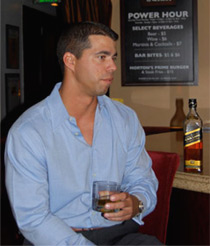Brett Graff’s Mixed Company
Brett Speaks with Christian Infante


This is a series of business interviews conducted by Brett Graff, a former U.S. government economist who today reports on money, power and the economic forces affecting real people. Dubbed “The Home Economist,” her work has appeared in The Miami Herald, Glamour, Maxim, Harper’s Bazaar, Redbook, Ladies’ Home Journal, Parents and Cosmopolitan. Online, she’s the financial expert for TheNest.com and writes for Bankrate.com, Yahoo! finance, Fox Business News, MSN.com, ModernMan.com, TheHomeEconomist.com and more. She’s been quoted by Women’s Health, The New York Times, The Fiscal Policy Institute, The Los Angeles Times, The Christian Science Monitor, Wikipedia and has appeared on CNN, PBS, CNBC and Headline News. She lives in Key Biscayne with her husband and daughters.
If you’ve never regarded the task of cleaning up after 30,000 partygoers in Bayfront Park to be a particularly glamorous job then consider this: Christian Infante’s janitorial, landscape and and security company generates $16 million a year in revenues and employs 480 people. It’s called SFM Services Inc. and it scrubs, protects and beautifies clients in every corner of the city including Viscaya, The City of Coral Gables, Baptist Health Services, The Miami Parking Authority, The Orange Bowl and yes, Bayfront Park, home of the extremely messy Ultra Music Festival.
What’s more, Infante won’t be in the bar at Morton’s The Steakhouse for longer than 20 minutes before he’s stopped by former City of Miami Mayor Manny Diaz – and afterward a few passing local executives — for a handshake and a hello.

“I don’t know about glamorous but it pays the bills,” he laughs. “We just cleaned a Halloween party in midtown Miami and my God was that a mess.”
We sat down for a glass of Johnnie Walker Black Label with Infante because when a person creates a multimillion dollar business before the age of 32, well, we want to hear how.
How’s your drink?
Johnnie Walker Black Label is what we drink to celebrate big deals. The last time we closed an account we went out immediately afterward and each ordered a glass of this very same scotch. We didn’t even think about it – Johnnie Walker is what’s in your glass when you’ve done an excellent job.
In that case, you must drink a lot of Johnnie Walker because you have some big accounts. How do you land them?
A lot of ways. Of course there’s the usual – the client puts out a request for proposals and we submit a bid. During the presentation we blow the competition out of the water because we have a big poster detailing our experience.
But sometimes it gets interesting. For example, we got a big account thanks to the company selling us janitorial supplies. It also sold to Baptist Hospital and introduced us to the health system in hopes we could do their service work. They knew that if we had more business we’d buy more supplies. That company saw the synergy and you know what? There are so many janitorial supply companies that knock on our door; this one got us business and that adds real value.
One time we even decided to work for our competitor. We bid on the job at the Bank Atlantic Center, where the Panthers play, and we lost because they said we didn’t have arena experience – even though we worked at the Orange Bowl, which is much bigger. Regardless, we spoke to the winning company about working as a subcontractor. Now, three years later, we’re doing 70 percent of the contract and no one again can ever tell us we don’t have arena experience.
Did you ever really — sorry, no pun intended – mess up?
Obviously we’re human; we’re going to make mistakes. My dad gave me some good advice: make sure you don’t make the same mistake twice. They get expensive.
Either way, you don’t seem to lose clients either, what’s the secret to keeping them?
We’re competitive and cost conscious. Rather than look for a huge margin overnight, we’re in it for the long run. We use all environmentally friendly cleaning products. In our landscape division, we take all our cuttings to a recycling plant and convert them to mulch. And neither is more expensive than conventional methods.
We do spend money on one thing: the latest equipment and good managers. We recently got a large vacuum that helps a guy clean in one hour what used to take four hours. That reduces our costs, ultimately.
It’s also worth paying for middle management people. You can try to save $10,000 on a salary but spending the money means finding a person who will produce so much more. At the moment, our events manager is someone who rose through the ranks — she began as a cleaner – she provides me peace of mind.
How did the company get started?
My father started it as strictly a janitorial company and after I graduated FIU I started the other two sectors – landscaping and security. But before that, I personally worked nearly every job at the company. We had a large, two-month landscape job in Key West and I went, sharing a room with four other landscapers. And now no one can tell me how long it will take to plant a tree. It takes 30 minutes. That makes me a better estimator as well.
And you added the landscape and security sectors?
Yes – providing a host of services helps our clients and our company. Our clients are already comfortable with us. If we’re working on a building’s security but it turns out the place has mold or needs tree trimmings, it takes them one phone call to solve the problem – rather than having to search and interview a dozen companies and calling references. One time we were doing a construction clean up and the client asked whether we could do asphalt repair. I called a reputable subcontractor, got a price, took a small mark up and made the client happy. I don’t want my clients looking anywhere else for anything they need. I’m here to solve any issue.
See the profiles for all of the young business leaders featured in Brett Graff’s Mixed Company Season 1.
Photography by Paola Padovan


